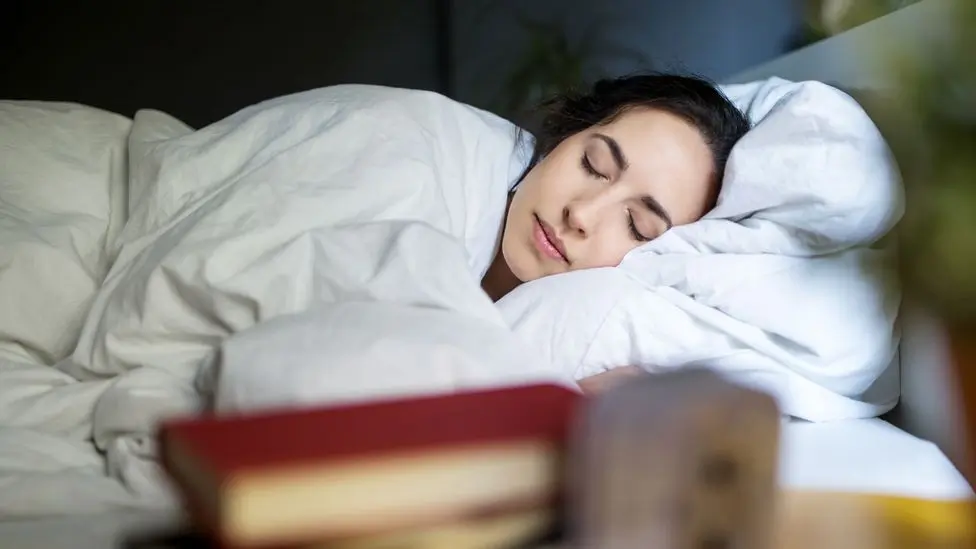These sleep tips can help you get better rest when the seasons are changing. I’ve included healthy sleep practices as well as natural remedies to help you feel your best.

Many people tend to have sleeping issues as the seasons change. Having to adjust to changing the clocks, different levels of sunlight during the day, weather changes and shorter (or longer) daylight can all throw off your internal circadian rhythms.
In the past I’ve had terrible insomnia and still deal with some sleeping issues on and off from time to time, but overall my sleep is so much better than it used to be. I learned all about natural sleep tips during my struggle with sleep and have found several things that were helpful.
General Sleep Hygiene
- Only use bed for sleep
- Have a regular bedtime
- Try to limit or stop screen usage a couple hours before bed—Blue light from screens mimics sunlight and can affect production of melatonin thereby affecting natural circadian rhythms. You can also get blue light blocking glasses to use or use a screen protector to block the blue light.
- Turn off most lights a couple hours before bed
- Get enough sunlight during the day or take vitamin D during winter (5,000 IUs with vitamin k which helps your body synthesize the vitamin)
- Eliminate caffeine– even if you only have coffee in the morning this can still sometimes affect sleeping cycles overall.
- Make sure you’re eating well. Blood sugar changes and hormonal issues caused by food can affect sleep. You can also get good nutrients from superfoods that are especially needed during colder months.
- Keep your immune system strong. It’s a cycle–a healthy immune system supports good sleep and good sleep keeps your immune system strong!
- Support healthy sleep with targeted supplements like the ones listed below…
5 Best Sleep Supplements for Changing Seasons
1. Melatonin
Melatonin is a hormone that is naturally produced by the body, but when seasons change and your body might be confused by daylight and time changes, melatonin production can be interrupted. This is why it’s especially useful for sleeping issues that are related to changes in seasons or time changes from traveling (jet lag).
Melatonin helps to reset your circadian rhythms and lets your body know it’s nighttime so you can get back on a regular sleeping schedule. Melatonin is best used in the short term to get you used to the changes in sleeping times.
Lower dose liquid melatonin can be helpful for times when you wake up in the middle of the night and have a hard time falling back asleep. I like this liquid sublingual melatonin since it tends to work faster and you can take a very small dose so you can fall back asleep for half the night and not be tired in the morning.
2. Valerian
Valerian is a flowering plant with roots that have been used traditionally for sleep for many years. Many studies have shown how effective valerian can be at supporting sleep. Valerian root aids rest by affecting neurotransmitters and hormones that help calm your body and mind.
Some say it works better after using it regularly for a couple weeks. Many people report seeing improvement taking 500mg of valerian root 30-60 minutes before bedtime.
3. Magnesium Bisglycinate
The human body naturally contains Magnesium, however many of us don’t get enough in our daily diet. This is where supplementation can come in handy.
Magnesium has been shown to help support sleep, balance circadian rhythms as well as promote calm. Magnesium Bisglycinate is a form of magnesium that is especially helpful for both.
Most people report that 250mg of Magnesium Bisglycinate before bed helps with promoting healthy sleep. Using the powder is especially helpful for the body to absorb it faster. Magnesium is also safe to take long term.
4. Passionflower
Passionflower supplements come from the actual flowering plant that has been used for centuries medicinally.
Passionflower has been shown to boost the levels of GABA in the brain which is a neurotransmitter that supports relaxation. A 2011 trial showed marked improvement in sleep quality for patients who consumed passionflower.
It is suggested to take 500mg of passionflower before bed to promote relaxation and support sleep.
5. Ashwagandha
Ashwagandha (also known as withania somnifera) has been used in Indian ayurvedic medicine for many years. It is an adaptogen which means that it may help your body uniquely adapt to stress. Not only is it known for supporting healthy hormones and responses to stress, but it’s also known for promoting good sleep.
One study released in 2020 showed that subjects who took ashwagandha for six weeks showed improved sleep quality.
Most find that taking 500mg of ashwagandha 2-3 times a day for at least 4 weeks may support sleep as well as response to occasional stress.




